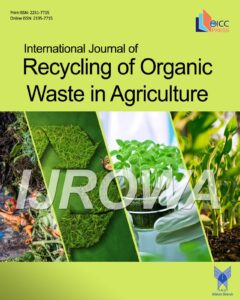Response of sweet sorghum to biosolids application under reduced irrigation regimes
Authors
Abstract
Purpose: The response of sweet sorghum to biosolids application under different irrigation regimes was studied in a field experiment conducted during 2010 and 2011 in Central Greece. The study assessed the effects of soil application of biosolids on plant height, biomass production, and water use efficiency.
Method: The experiment consisted of nine treatments with three replications, including the application of biosolids to the soil, the application of fertilizer, and an untreated control, with three levels of irrigation (100%, 80%, and 60% of the crop water needs).
Results: The study found that plant height was similar regardless of whether biosolids or fertilizer was applied. Under reduced irrigation, the application of biosolids at a rate of 5 Mg/ha resulted in a 9.2-11.5% increase in dry biomass production of sweet sorghum compared to dry biomass production from inorganic fertilizer application. When biosolids were applied with reduced irrigation, the dry biomass yield was similar to that produced by inorganic fertilizer application under full irrigation. Additionally, this was achieved while using 31.4% less irrigation water. Biosolids application to soil improved water use efficiency by up to 34% compared to fertilizer application.
Conclusion: The findings of this research suggest that substituting inorganic fertilizers with biosolids application can lead to significant water savings.




